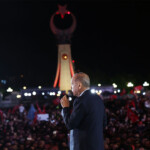As Clinton predicted, Turkey’s future has and will be “critical to shaping the 21st century” for many reasons. But not for the reasons he had hoped.
“Turkey’s past is key to understanding the 20th century. But, more importantly, I believe Turkey’s future will be critical to shaping the 21st century.” So said Bill Clinton, the former President of the U.S, in his historical address to the Turkish Grand National Assembly (TBMM), on November 15, 1999. “There are now billions of people around the region and the world whose future depends upon decisions made in this very room over the next 25 years.”
We are almost there, after nearly a quarter of a century. While his timeline for Turkey’s road map seemed prophetic, the actual result of the country’s journey has become a major part of a world in commotion today.
But given Turkey’s slow motion shift to a hard-core autocracy—seemingly destined for full-blown dictatorship—one thing is clear: The “decisions made in that very room” brought Turkey’s 100-year-old fragile order, as well as the stability of its geopolitical architecture, to a near collapse. For a while, the government under Recep Tayyip Erdoğan seemed it could deliver, but it ended up doing just the opposite.
Nevertheless, as Clinton predicted, Turkey’s future has and will be “critical to shaping the 21st century” for many reasons.
It is not an exaggeration to say that the May 2023 elections, marked by the republic’s centennial, also drove the final nail in its coffin in terms of its foundational secular identity.
Its spiral into oppressive darkness began with the Gezi Park protests as a milestone and snowballed into authoritarianism, escorted by swaths of international quasi-analysis in the service of apologism and appeasement, blended with a mish-mash of terms like “illiberal democracy.”
What’s far worse, domestically, is that the so-called centrist opposition,—united with Erdoğan’s power circle in its allergy to the Kurds’ aspirations for civil rights—failed to stop the drift towards one-man rule. Its inability to pull the brakes on the collapse of freedom and rule of law has become apparent. To return to Clinton’s words: the decisions of the past decade “in that room” were those of a rubber-stamp Parliament acting for a power-hungry ruler.
Much of the analysis in the post-election period has focused on Erdoğan’s victory by 52-48 % in the Presidential leg of the polls, and we have seen the opposition arguing – rather, whining – that he won by a small margin, and that still the 48 % – about 25 million voters out of a total of 55 – is a crowd to reckon with.
But we have known for the past decade that Turkey has been a clear cut case of a solid majoritarianism, with which Erdoğan was given a free ride by a weak, timid, and fragmented opposition in Parliament. Instead of creating a bold political program to reconnect Turkey to a global democratic context, the opposition chose to retreat into a bubble, marked by nationalism, with which it hoped to compete with Erdoğan, who had already become a master of it.
For example: it is remarkable that neither Kemal Kılıçdaroğlu, leader of the main opposition CHP, nor his ex-ally Meral Akşener, leader of IYIP, bothered to widen their channels to their sister parties in Europe, let alone to political figures in the USA. CHP’s Washington or Brussels offices have been entirely inefficient, run by incompetent bureaucrats. The number of official visits these two leaders paid to European captials in the past decade does not exceed four or five.
It is therefore no surprise that post-election Turkey now exposes an opposition block in the throes of an identity crisis. They have failed to meet the expectations of the electorate, and in their refusal to be held accountable they seem to be pretending that the massive disappointment at the grassroots level does not exist. In fact, what we see now are clear signs of depoliticization in Turkey—a lack of belief in politics and a growing fatalism about the future. This portends a tragedy of huge magnitude.
The presidential election has also overshadowed crucial parliamentary changes. Because of the erratic calculations and conduct of Kılıçdaroğlu, the so-called Table of Six have now turned their backs on him, having gotten what they wanted. They were handed nearly 40 seats by the CHP, essentially strengthening the massive far-right block in Parliament. As a result, both the CHP and the pro-Kurdish HDP/YSP are at their weakest.
Neither of these parties seem to mind the shift to right. Their leaderships have not openly aired their mistakes or, more importantly, their concerns, for Turkey’s future. Their “business as usual” attitude, along with the opposition parties on the right, will provide the legitimacy that Erdoğan needs for the regime he is busy building. There are now 15 parties represented in Parliament—a strong argument for “pluralism” that Erdoğan and his partners can keep in their arsenal and use generously. And—given the conformism of the opposition deputies – they are justified in doing so.
Therein lies the potential for further darkness. A simple calculation across the conservative and nationalist right in Parliament shows a constitutional majority. Nine parties have more than 410 seats, having laid a fertile ground for Erdoğan, whose next step—along with “taking back” Istanbul in local elections early next year—is a conservative (some may call it reactionary) Constitution, which will practically end what he calls the “Republican parenthesis” of the past 100 years. Because he will use sensitive rhetoric about national/moral values and religion, it will be impossible for those nine parties to resist and defend the tenets of secularism and gender equality.
Clinton was right to underline Turkey’s importance within the past 25 years, but not for the reasons he and many others had hoped—as a free, pluralist, wealthy, reliable and stable country. Fasten your seat belts even tighter now, because Turkey’s course shows clear signs of irreversibility. For this, much of the blame will have to go to the opposition—still convulsing in a deadly vortex.
The views and opinions expressed above are the author’s and do not reflect those of the Free Turkish Press.


